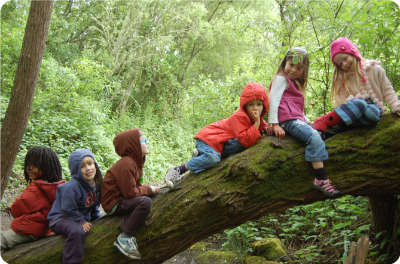
What is Waldorf?
Founded in Europe in the early 20th century, Waldorf education
is based on the insights, teachings and principles of education
outlined by the scientist, philosopher and social reformer Rudolf
Steiner. The principles of Waldorf education evolve from a rich
understanding of human development that addresses the needs
of the growing child—from preschool through high school. It is a
balanced and holistic approach, engaging the child’s thinking,
feeling and willing—their head, heart and hands—in ways that
support the developmental phases of childhood. In a Waldorf
school, teaching is transformed into an experiential and creative experience for the child, inspiring a life-long love of learning, an
appreciation for beauty and the value of artistic work, and an understanding of meaningful social interaction. According to Steiner, “Our
highest endeavor must be to develop free human beings, who are able of themselves to impart purpose and direction to their lives.”
Central to Waldorf early education is the preservation of childhood. There is an understanding of the innate awe and wonder of the young
child and an awareness that the young child learns through imitation, imagination and the integration of his/her own will. This concept is
ever present at Redwood Garden, as the teacher strives to be a model worthy of imitation and to create a secure, inviting and joyful
environment where the young child’s growing senses, imagination and awareness of self and others can develop—through creative play,
close connection to nature and seasonal change, practical life skills and artistic opportunities. The carefully crafted rhythm nourishes the
young child’s sense of well-being so that the child may readily find comfort in its familiarity and may flow in and out of activities intuitively
and effortlessly.
Also effortless is the way in which the strongest foundation for future learning is set. Opportunity for meaningful imitation, creative play,
and the weekly activities of painting, drawing, craft, cooking, baking and gardening support healthy physical development, the central
need of the early childhood years, leading to health and vitality for later life. These activities support healthy social interaction--the ability
to play together, take turns, listen to one another and resolve conflict--and allow the child to experience being fully engaged in one’s work
and to follow a task to completion. Through the repetition of song, poem and story, the child develops an appreciation for the richness of
language and strengthens concentration and memory. Through creative play and storytelling, the children are able to process their own
unique life experience and see their own inner pictures. They are able to access what is authentic in them, the most fertile ground there is
for a healthy, independent and creative approach to learning and lifelong development. To learn more about Waldorf education, please
visit: www.whywaldorfworks.org and www.waldorfearlychildhood.org
Waldorf education enables young people to be in love with the world as the world
should be loved.”
Marjorie Spock, Author and sister of Benjamin Spock
redwoodgardenpreschool@gmail.com | berkeley, california | 510.524.4606